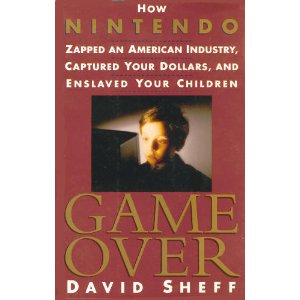Book Review ? Game Over
As I’ve mentioned in my review of The Soul of a New Machine, I enjoy reading about the history of the computer industry. As you’ve probably gather from all my magazine recaps, I also enjoy learning about the history of the video game industry. Consequently, I enjoy books that fall in the category where the two Venn diagrams overlap. They do so with the book I’m reviewing this week, Game Over: How Nintendo Zapped an American Industry, Captured Your Dollars, and Enslaved your Children.
I’ve been really hesitant about picking up this book in the past. The subtitle feels like the kind of anti-Japan jingoistic bullcrap that turned me off of Michael Crichton, off of Clive Cussler, and off of Tom Clancy in the 90s. However, reputable video game web pages and magazines, like Game Informer and 1up had said good things about the book, so with reservations I checked out the book from the library.
First thing I need to say, the subtitle of this book is a lie. It’s sensationalist crap which I presume was added by the publisher, to try to sell extra copies by either appealing to people who embraced the anti-Japanese racism that was popular and slipped into the mainstream in the early 90s, appealing to people who embrace anti-video game hysteria, or by attempting to troll people. The book has an incredibly even handed tone.
Much like The Soul of a New Machine, the book charts the rise of Nintendo to prominence as a Console manufacturer, profiling each of the important corporate executives in Nintendo, from the CEO (and his wife), to the President and the CEO of Nintendo of America, to the designers who built the games and systems that made Nintendo great. We see the good things and bad things about the people, and there isn’t any focus on negative or depressing really. Yes, Soul of A New Machine went kind of heavy on the soul-crushing, but I don’t think it was an intentional decision of the writer to focus on that, the job was just soul-crushing.
The first 7/8ths of the book is stuff I really hadn’t encountered before. I didn’t know the background of Nintendo aside from the basics. I didn’t know how Nintendo got established in the United States. I didn’t know the details of how Nintendo managed to get their consoles into stores while evading the specter of the death of the Atari 2600 and the end of the crash. Most importantly, I didn’t really know the details about the history of Tetris in the US. I knew Tengen Tetris was the better game over Nintendo Tetris, and I felt that the better game was pulled off the market. The book established that Nintendo was really in the right here, by helping to unravel the cat’s cradle that was the licencing agreements for Tetris when it was first released in the west.
I also felt that Tengen got unnecessarily picked on. This book really broke those illusions. Atari Games picked a fight with Nintendo with malice and forethought. To use a wrestling analogy, Tengen came down to the ring and demanded a match with Nintendo, and got the stuffing beat out of it. It even tried cheating and it didn’t work. Tengen deserved what it got.
The book though isn’t without it’s faults. The last 1/8th of the book, frankly, covers material that if you can easily pick up from reading my EGM recaps here – the saga of Nintendo, Phillips, Sony, and the SNES CD-Rom. Additionally, as the book came out in 1993, my recaps have gone beyond that, to the N64, and Nintendo ultimately losing the #1 spot. Also, the book is unnecessarily hard on Sega – when the book addresses Sega, it basically says that the Genesis didn’t have any fun games. That’s far from the truth. It had Golden Axe, it had Streets of Rage, it had the Sonic series (which in particular they say wasn’t fun), it had Phantasy Star, and it has Shining Force, among many other games. While the Genesis was #2 behind the SNES in the console wars, it wasn’t behind by much. It only lost because of Sega splitting it’s install base repeatedly with add-ons like the Sega CD and the 32X, and not being able to stick with just one.
Otherwise, despite this book’s subtitle (which was apparently dropped for re-prints), this is an excellent book about of the history of Nintendo. If you’re reading this blog you like retro video games, and learning about them. This is a good book for you.
Filed under: Books, Reviews Tagged: book review, Books, history, Video games





0 Comments
Recommended Comments
There are no comments to display.